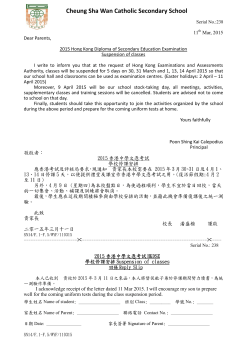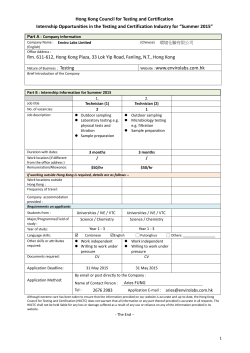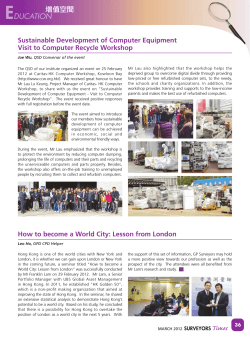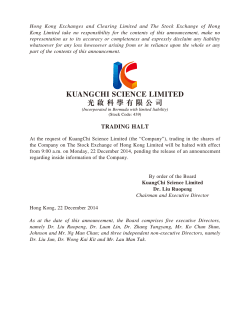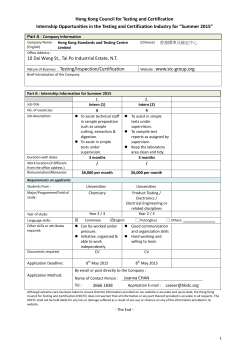
Untitled - Pacific Tycoon
Big Deal Report: North America Trade between North America (the USA and Canada) and China is of vital importance. The USA and China are the first and second largest economies respectively. Therefore, any deal between the two will provide a significant boost to global economic output. Canada is resource rich and has deposits of oil, gas, metals, gold and gemstones. An agreement that grants the Dragon Economy increased access to these essential minerals will allow it to grow and prosper. This edition of the Big Deal report is going to look at trade agreements between China, the USA and Canada and the impact on the global economy, trade patterns and ongoing negotiations for further deals in the future. China and the USA At the end of 2014, China and the USA signed a deal that would lead to a sharp reduction in tariffs on the transportation of high-tech goods. The deal followed a staggering 18 months of negotiations between these two superpowers and will update and modernise the World Trade Organisation’s 1996 Information Technology (IT) Agreement. Despite competition between the two economies to be the largest and wealthiest in the world, the deal highlights willingness to cooperate and negotiate in areas that will benefit both the USA and China. With the global IT industry worth more than $4 trillion and a predicted $1 trillion rise in the value of technology trade, the impact of this deal could be vast. However, the effect could be even greater than the boost to technology trade. Following the successful conclusion to the ITA deal, it is thought that further agreements could now be reached between the USA and China. This could lead to the “first major tariff-slashing initiative at the World Trade Organization in nearly 20 years”. The ITA agreement could be a stepping stone to a full trade and investment deal between the two nations whilst China also looks set to join US-led negotiations over the $4 trillion-a-year global trade in services. The long term benefits of the agreement between China and the USA could be a move toward a number of even more significant deals that would provide a vast stimulus to the global economy and trade in addition to supporting growth in both economies. China and Canada In the second half of 2014, China and Canada agreed a trade deal worth close to $2.5 billion. This followed agreements made in 2012 that were worth $3 billion, highlighting the scale and potential of the economic harmony between these two countries. As part of the 2014 deal, China and Canada have agreed to a set of measures that will provide the Renminbi a greater role in trade, commerce and investment. The deal will also increase Canadian nuclear exports to China and mark the normalization of cherry trade between the two, valued by the industry at $20 million annually. A number of business-orientated deals were also reached that will support the prospects for a number of key firms and sectors within both Canada and China. Bombardier announced China Express Airlines as the customer for 16 of its CRJ900 regional jets, with the option to buy eight more. The full sale will be worth $1.12 billion. Furthermore, to support China’s bid to build a greener economy and reduce the amount of pollution created, Canadian waste-to-energy and air pollution reduction technology will be brought to the Dragon Economy. In addition to supporting both economies and a number of firms and industries, the 2014 trade deal has the potential to act as a precursor to future agreements. For example, in March 2015, China agreed to provide 10-year multiple-entry visas that will reduce costs, cut red tape and allow Canadian companies to prosper within China. Canada’s economic strategy has focused on developing closer economic ties with a number of Asian economies and its relationship with China is key to this long term objective. China and North America China is the second largest economy in the world, the number one trading nation, and has the strongest economic growth amongst major developed countries. Further agreements between the USA and China will benefit both of these economic superpowers while Canada can offer access to strategically important resources including fuel and metals. In recent years a number of deals have been reached however there is potential to vastly increase the scope and scale of the economic relations between China and these vital North American economies. In the long term, these deals will ensure that world trade continues to expand, economies continue to grow and the shipping industry prospers and thrives. Pacific Tycoon’s head office is based in Hong Kong, at the heart of the booming East Asian economy. Benefiting from our proximity to the industrial and businessled projects transforming China, we endeavour to monitor and understand each one closely. For further details on the trillion dollar projects shown on this map, visit our website: www.pacifictycoon.com Beijing South Railway Station Jiuquan Wind Farm Ningdong Energy and Chemical Industrial Base South to North Water Diversion Project Shanghai-Hangzhou Maglev Project Hangzhou Bay Bridge Beijing-Shanghai High Speed Railway Kumming New International Airport To speak to a member of our team, please contact us. Hong Kong Office Telephone: +852 580 16695 Email: contact@pacifictycoon.com www.twitter.com/PacificTycoon | www.facebook.com/pacifictycooninvestments Pacific Tycoon Level 11, Admiralty Centre Tower 2,18 Harcourt Road, Admiralty, Hong Kong.
© Copyright 2025

